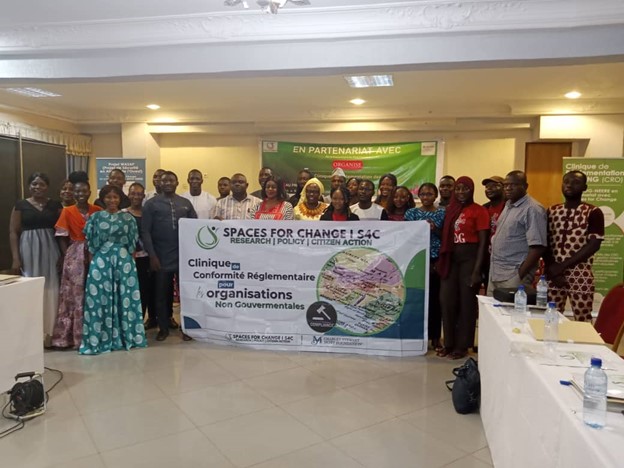
Spaces for Change | S4C is extending its Regulatory Compliance Clinic to nonprofit organizations (NPOs) operating in Francophone countries in the West Africa sub-region under its West Africa Security Advocacy Project (WASAP) supported by the Charles Stewart Mott Foundation. Senior executives of twenty-five (25) NPOs operating in Burkina Faso and Senegal participated in the 2-day training held in Ouagadougou from May 29 to 30, 2024. The RCC is an institutional-strengthening initiative that equips NPOs with the resources and skills needed to discharge the regulatory compliance obligations applicable to charities under various national and international legal frameworks, including mitigating terrorism financing threats in the systems they work within.
Burkina Faso and Senegal are currently on the Financial Action Task Force’s (FATF) list of “jurisdictions under increased monitoring.” This means that the two countries are currently taking steps to address deficiencies in their Anti-Money Laundering/Countering the Financing of Terrorism (AML/CFT) frameworks, systems and institutions. Both countries conducted national risk assessments of money laundering and terrorism-0financing in 2017, which concluded that the vulnerability of NPOs to terrorist financing (TF) is medium to high. Mutual Evaluation Reports (MERs) by the Inter-Governmental Action Group against Money Laundering in West Africa (GIABA) revealed that Burkina Faso and Senegal showed that both countries scored low on 9 and 10 out of the 11 immediate outcomes, respectively, justifying their inclusion on the FATF grey list. Specifically, they received a Partially Compliant rating on Recommendation 8 and low effectiveness on Immediate Outcome 10 concerning the nonprofit sector. In response to these findings, S4C’s Regulatory Compliance Clinic has been designed to enhance the capacity of NPOs operating in these countries to effectively mitigate their risks to terrorist financing.
The training sessions at the Clinic emphasized the importance of having diverse and skilled Board members capable of providing strategic direction, oversight, and governance as a primary means of mitigating the abuse of NPOs for terrorist financing, outlining the processes for recruiting, training, and retention to ensure their effectiveness. Another significant focus was on implementing robust internal AML/CFT controls, encompassing the development and maintenance of comprehensive policies and procedures to detect and prevent money laundering and terrorist financing activities. This included strategies for risk assessment, internal audits, and regular staff training. Participants were also guided through their legal and regulatory obligations, such as financial reporting, tax filings, and compliance with national and international regulations, and provided with practical tools and resources to help them avoid potential legal pitfalls.
Subsequent sessions enlightened participants on the nature of terrorism financing threats in the subregion, the legal frameworks regulating money laundering and terrorism financing globally and in their respective countries, and the standards for implementing a risk-based approach to combat ML/TF. Independent expert presentations shed light on measures to strengthen the capacity of NPOs to understand and deal with bank de-risking – providing global and regional best practices. Through these sessions, participants gained knowledge and practical strategies to enhance their organizations’ resilience and effectiveness in the face of evolving regulatory changes to contemporary threats to regional and global security.
The Clinic wrapped up with group exercises to test participants’ understanding and ability to apply the knowledge gained to real-life scenarios. Through these exercises, participants learned how to identify terrorism financing risks, the inherent vulnerabilities that threats can exploit and the various ways in which terrorism financing risks undermine the credibility of their charitable work. Moreover, participants were able to offer contextual recommendations on self-regulatory measures for combating terrorist financing in their respective operating environments.
Looking ahead, Spaces for Change plans to expand the Regulatory Compliance Clinic to more NPOs operating in more West African countries, advocating for the proper application of FATF Recommendation 8 by countries in West Africa. In the recently revised Recommendation 8 (R8) Best Practice Paper, S4C’s Regulatory Compliance Clinic has garnered recognition from FATF as a global best practice for addressing terrorism financing abuse in the non-profit sector.



